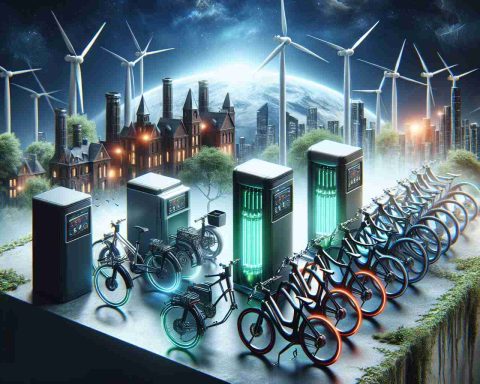- China is leading significantly in electric vehicle battery technology, with a reported ten-year advantage.
- This dominance necessitates American manufacturers to leverage intellectual property and innovations from China.
- Battery efficiency and sustainability are crucial as the global market shifts toward greener technologies.
- American automakers must innovate and adapt strategies to remain competitive against international rivals.
- Collaboration and technological advancement are vital to navigating the rapidly evolving automotive landscape.
- The response of U.S. companies today will significantly impact the future direction of electric mobility.
In a striking revelation, Ford’s CEO has laid bare a dire truth for the American automotive sector: China is not just leading the electric vehicle (EV) race; they are reportedly a staggering ten years ahead when it comes to battery technology. This bold statement sent shockwaves through the industry, highlighting the fierce competition in the global market for electric mobility.
With China’s dominance in EV batteries, Ford acknowledges a pressing need to tap into the intellectual property (IP) and innovations emerging from this powerhouse. As the world rushes towards a greener future, battery efficiency and sustainability have never been more critical. The competition is heating up, and the stakes have never been higher.
Could this mean that U.S. manufacturers must rethink their strategies or risk being left in the dust? The urgency for American companies to innovate and adapt is at an all-time high. Ford’s acknowledgment is a clarion call for the industry: collaboration and technological advancement are essential to keeping pace in this rapidly evolving landscape.
As the race for EV superiority continues, American automakers face a pivotal moment. The key takeaway? Embrace innovation, foster global partnerships, and don’t underestimate the advancements happening overseas. The future of the automotive industry hangs in the balance, and how companies respond now could shape the entire landscape of electric mobility for years to come.
Shocking Insights Revealed: Why American Automakers Must Act NOW!
## The Reality of Battery Technology: A Decisive Factor in EV Advancement
In the fierce competition for electric vehicle (EV) supremacy, recent statements from Ford’s CEO have unveiled a stark truth for the American automotive sector: China is reportedly ten years ahead in battery technology. This revelation emphasizes the significant challenges U.S. manufacturers face as they strive to keep pace with this rapidly advancing industry.
Key Highlights:
1. Battery Innovations: Chinese companies have made substantial investments in research and development (R&D), leading to advancements in energy density, charging times, and cost reductions that U.S. automakers are currently racing to match.
2. Sustainability Initiatives: As battery technology evolves, sustainability practices, including recycling and sourcing ethically, have become pivotal. Companies are now exploring how to integrate sustainable practices into their battery production processes.
3. Technological Collaborations: Ford’s acknowledgment of the need to leverage intellectual property (IP) from China highlights a growing trend of global partnerships as a strategy for overcoming technological gaps.
Major Questions Addressed:
1. What are the implications of being behind in battery technology?
– The U.S. automotive industry risks losing market share and consumer trust as consumers increasingly favor vehicles with superior battery performance and sustainability. Staying competitive may require significant overhauls in current EV strategies.
2. How can U.S. automakers close the gap in EV technology?
– Embracing innovation through partnerships, investing in R&D, and fostering collaborations with technology firms and universities can serve as stepping stones toward achieving parity with Chinese advancements in the EV sector.
3. What strategies should American manufacturers adopt to remain relevant?
– A multi-faceted approach involving increased investment in battery technology, enhancement of supply chain resilience, and a focus on sustainability will be crucial. Additionally, manufacturers must prioritize consumer education about the benefits of their innovations.
Emerging Trends:
– Vertical Integration: Companies are starting to vertically integrate their supply chains, controlling more aspects of battery production, from raw materials to manufacturing processes.
– Solid-State Batteries: There is a growing interest in solid-state battery technology which promises to deliver higher energy density and greater safety compared to conventional lithium-ion batteries.
Looking Ahead:
Innovation and adaptation are imperative for American automakers to navigate a landscape increasingly defined by rapid technological advancements. The future of electric mobility will favor those who can successfully collaborate globally and invest in groundbreaking technologies.
Suggested Related Links:
– Ford Official Site
– Tesla Official Site
– Electrek














